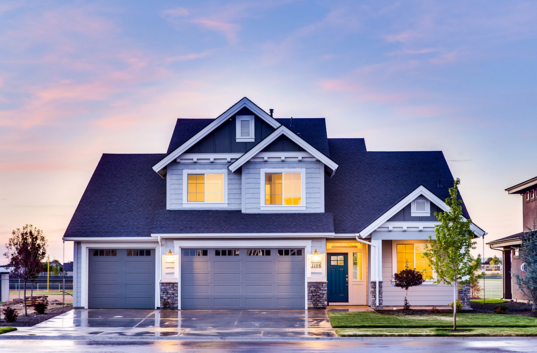If you have spent weekend after weekend trudging from one unsuitable house to the next, you may have concluded that you will never find the perfect home. In that case, you may be thinking that building your own home would be a better option. Or maybe you’ve long had a self-build dream, and now’s the time to realise your vision. If so, then read on for where to start with building your own home.
1. Decide What Your Budget Is Going to Be
Working out your budget is step number one. There are two ways you can go about creating a budget: You could find the land, design your perfect house, work out how much it will all cost, and then see if you can afford it. But that only really works if the cost is no issue for you. For most people, unfortunately, it is. The other way is to work out how much you can afford. Based on that, and with the help of architects and builders, you can work out what you’re able to build. You’ll need to get accurate estimates and don’t forget to find out how much all the hidden extras are going to cost you, such as fees and taxes you’ll have to pay the council and the government. Then factor in a contingency. Most people say 10% for this in the hope that it will be less, but in the knowledge it can sometimes be more. Once you have your budget, then you need to stick to it.
2. Make Sure You Know What Restrictions Apply To Your Build
For example, you may be building in a zone where there is a higher than average risk of fires. If that’s the case, then you cannot use the same building materials that you would use in a ‘normal’ residential area. Are there any trees that have a protection order on them? If so, you will need to design your build around them rather than cutting them down. Some districts only allow buildings designed in a certain way, or using certain materials so that they fit into the local area. Your architect or town planning services may be able to help with these kinds of issues.
3. Find Out About the Local Area
There is little point in finding the perfect spot for your new home only to discover that there are no schools for your children, or shops conveniently close, or opportunities to be entertained.
Make sure you have a conversation with those in your household about what you need to prioritise in a local area, and what you are likely to need in the future. You might be able to put up with the fact you have to drive to the nearest shops now, but if you intend to stay in the house for very many years, will that suit you later in life?
4. Use Experts You Can Trust
Ensure you do your homework when it comes to the people you enlist to help you get your build achieved. Check out things like credentials, certifications, and references as these will help you make a good choice. You also need to know that your builder can do the job for the right price and that they can complete it in budget and as close to on time as possible. A recommendation is better therefore than choosing someone you have no knowledge about.
Additionally, whoever you choose, needs to be someone you can get on with. If they are great at building but they rub you up the wrong way, then that could put this build in jeopardy. But be careful. Make sure that great personality isn’t hiding a lack of experience.
5. Be Prepared To Make Some Compromises
While you may know exactly what you want, and you may feel like you don’t want to compromise on any of it as this is a once-in-a-lifetime build, at some point you may need to admit that it isn’t possible to get it all in budget. So, if you’re dreaming of a pool, a guesthouse in the back garden, and a helipad, you may need to settle for something more realistic. There is always the possibility of upgrading or adding to your home in the future.
Wrapping It All Up
Building your own home will undoubtedly be one of the steepest learning curves you will go on in your lifetime, but it is also one of the most rewarding and exciting adventures you’ll ever undertake too. Just remember to take your time when making decisions and do your homework. No-one wants to spend any of their precious budget ‘undoing’ decisions they later regret.






